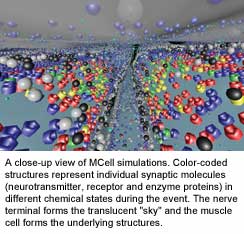The overwhelming data produced by the Human Genome Project is propelling Pittsburgh and Carnegie Mellon to the head of the class in biotech research.
One key reason is the Pittsburgh Supercomputing Center (PSC), a joint effort of Carnegie Mellon University, the University of Pittsburgh and Westinghouse Electric Corporation.
“Techniques we’ve developed are helping scientists nationwide cope with the explosion of genome data,” said David Deerfield, director of PSC’s biomedical initiative.
The PSC has trained more than 3,100 researchers in the use of high-performance computing for biomedical research, in such areas as sequence analysis in genome research, the structure of proteins and DNA, and biological fluid dynamics.
It also has provided computing resources for more than 1,000 biomedical research projects involving thousands of researchers in 46 states and the District of Columbia.
In addition, the biomedical group carries out research in structural biology, protein and nucleic-acid sequence analysis, computational neuroscience and microphysiology, and biomedical visualization.

Among the PSC’s in-house projects is MCell, a computer modeling program that is helping researchers crack the mysteries of neuromuscular disease. MCell is the result of a collaboration between Joel Stiles, a PSC research scientist and associate professor at the Mellon College of Science, and scientists at Cornell University and the Salk Institute. This simulation program, which lets investigators model the dynamics of chemical signaling such as at the nerve-muscle junction, has already shed light on the nature of a rare, debilitating neuromuscular disease and may lead to improvements in diagnosis and treatment.
Related Links:
Mellon College of Science
Pittsburgh Supercomputing Center
PSC's Biomedical Initiative
Joel Stiles
MCell Simulation Program



